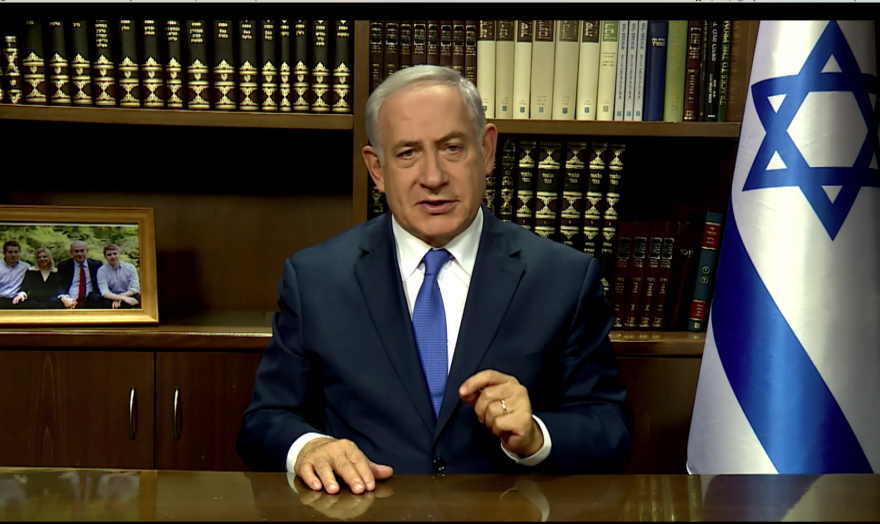WASHINGTON (JTA) — Prime Minister Benjamin Netanyahu urged influencers of Middle East policy to do what it could to “seize the opportunity” presented by President Donald Trump when he decertified Iranian compliance with the nuclear deal.
“President Trump has created an opportunity to fix the grave flaws of the JCPOA,” Netanyahu said Sunday during a video address to the annual Saban Forum — a gathering of U.S. and Israeli policymakers, scholars and advisers, referring to the deal’s formal name, the Joint Comprehensive Plan of Action. “I urge you in the policy community to help decisions makers in the capitals of Europe and Capitol Hill to take advantage of this opportunity.”
Trump’s decision in mid-October not to certify Iran’s compliance with the deal, which trades sanctions relief for Iran’s rollback of its nuclear program, triggered a 60-day period in which Congress may re-impose sanctions with simple 50 percent-plus-one majorities in the U.S. House of Representatives and the Senate. That expires in less than two weeks, and then any changes would be considered under the Senate’s usual format, which would require 60 votes to advance any legislation — a much higher bar. Democrats, who control 48 seats in the Senate, have said they would resist any move to alter the deal.
Republicans in Congress and the Trump administration want to work with European partners to the deal to toughen its restrictions — for instance, by removing sunset clauses currently in place that remove restrictions on Iran within the next decade or so. The European partners — as well as Russia and China, which also are parties to the deal — say no changes are necessary because Iran is complying with the deal, according to nuclear inspectors. Europe has signaled a willingness to crack down further on Iranian disruptive behavior outside the parameters of the deal.
Netanyahu repeated pledges not to allow Iran to develop a nuclear weapon or entrench itself in Syria, where its forces are backing the Assad regime in that country’s civil war.
“We will not allow a regime hell-bent on the annihilation of the Jewish state to acquire nuclear weapons,” he said. “We will not allow that regime entrench itself militarily in Syria as it seems to do for the express purpose of eradicating our state.”
He also struck what was for Netanyahu an unusually optimistic tone, imagining an Israel at peace with its neighbors and the world in 50 to 100 years.
“My friends one day the Iranian regime will fall. Iranian mothers and fathers will rejoice in the streets,” he said.
“Israel will be the first in line to restore relationships and restore our great partnership,” Netanyahu said. “That’s just one reason why I’m so hopeful about our future.”
He signed off with a signal to American Jews that he is heeding their complaints about his reneging on a deal that would have expanded the rights of non-Orthodox Jews at the Western Wall, among other demands for greater religious freedoms in Israel.
“I see a thriving relationship between Israel and Jewish communities no matter how they pray or where they’re from,” he said.
The Saban Forum is convened annually by the Brookings Institution and is named for its principle funder, Israeli-American entertainment mogul Haim Saban.
JTA has documented Jewish history in real-time for over a century. Keep our journalism strong by joining us in supporting independent, award-winning reporting.






